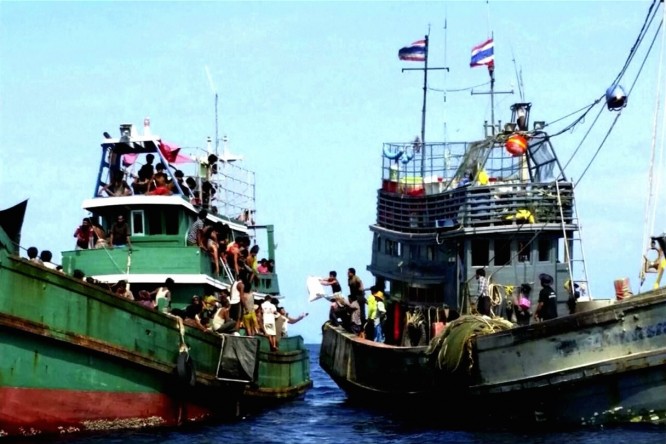People smugglers are exploring new routes to Malaysia after a crackdown on trafficking in Thailand with no large migrant boat departures from Burma and Bangladesh in nearly six months, aid agencies said.
Rising numbers of Rohingya Muslims fleeing persecution were setting off from Burma’s northern Arakan State and Bangladesh in small boats and transferring to larger boats that could carry more than 1,000 people each.
But a Thai crackdown on human traffickers in May halted journeys by large smuggling boats across the Bay of Bengal to Thailand and Malaysia with activists only hearing unconfirmed rumours of a few small boats.
Aid agencies, however, fear the halt in sea crossings does not indicate an end to people trafficking but means smuggling gangs are exploring new routes.
“We don’t see new ones, but we know different routes are being studied so they don’t have to be moved by boat,” said Chris Lewa, founder of the Arakan Project, a rights project focusing on the Rohingya.
[related]
“Some boats may leave, but there is definitely a strong impact of the Thai crackdown … The kind of movement and recruitment happening last year is not happening this year. It’s a lot more clandestine.”
Lewa said new routes could be by air or overland and aid workers were now monitoring the area to identify the shift.
The United Nations refugee agency (UNHCR) had warned that, “the number of people leaving on smugglers’ boats in the Bay of Bengal has increased in recent years, and that trend is likely to continue unless the root causes are addressed”.
HALT IN BOAT DEPARTURES
Throughout 2013 and 2014, activists tallied at least 1,000 people – and often several thousand – leaving each month from Arakan State and Bangladesh.
The number peaked a year ago this month at more than 13,000 people, but stopped in May amid a boat crisis and the Thai crackdown.
“There have been zero since May,” said Jeff Labovitz, who heads the regional office of the International Organization for Migration. “There has been a fundamental change. There are no more big boats sailing.”
But aid workers say the demand is still there.
The persecution of the stateless Rohingya in Burma has worsened this year and elections next month may bring in a new, hardline Buddhist party which may treat them still more harshly.
Communal clashes in 2012 in Arakan State forced 140,000 Rohingya from their homes, and many are virtual prisoners in camps or in segregated villages, subject to restrictions on travel and, in some areas, access to healthcare and education.
In February the Rohingya were granted temporary “white card” identification cards so they could take part in the 8 November election, but after Buddhist protests the government revoked the cards, effectively denying Rohingya the right to vote.
“They are politically disenfranchised. The situation in Arakan is worse than a year ago,” Lewa said. “The push factor is stronger than last year, but the open door to Thailand now seems to be closed.”
The Thai coast – not far from popular tourist areas – was a disembarkation point for many Rohingya smuggled by boat. They were then taken further south and over a porous border into Malaysia.
However, traffickers began diverting migrants to secret camps near the Thai-Malaysia border, holding them for ransom and killing and torturing those whose families could not pay up. Others died of disease and neglect.
After the discovery in May of dozens of graves on the Thai-Malaysia border, smugglers abandoned thousands of migrants at sea to avoid being caught by Thai and Malaysian investigators.
Julia Mayerhofer, interim executive director of the Asia Pacific Refugee Rights Network (APRRN), said the root cause of discontent was still there in Burma.
Amnesty International, which released a report on Wednesday about the region’s trafficking crisis, pressed Burma to stop violence against the Rohingya by state security forces, and to amend its laws to grant the Rohingya citizenship.
“People are still desperate to leave. If you block one way, people will find another way, and that might be more dangerous and more risky for the people,” Mayerhofer said.



